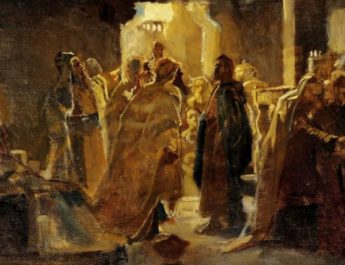1 Corinthians 1:25-31
A Women’s Lectionary 14
25 For God’sA foolishnessB is wiserC
A “God’s” = Theos. From Proto-Indo-European origins, meaning do, put, place. This is God or a god in general.
B “foolishness” = moros. 12x in NT. This is foolish, dull, stupid. It is something lacking an edge so figuratively it refers to someone who has a loose grasp of reality or whose understanding is dull. It is someone who acts as though they have not brain.
C “wiser” = sophos. Related to saphes (clear). This is wise, clever, skilled, learned, cultivated. This is wisdom as expressed through a practical skill or ability as opposed to thoughtfulness, or intelligence.
than humanD wisdom, and God’s weaknessE is strongerF than human strength.
D “human” = anthropos. Probably from aner (man, male, husband) + ops (eye, face); {from optanomai (to appear, be seen); perhaps from horao (become, seem, appear)}. This is human, humankind. Used for all genders.
E “weakness” = asthenes. From a (not) + sthenes (strong, vigor); {from the base of sthenoo (to strengthen so that one can be mobile); from sthenos (strength)}. This is without strength so weak, sick, helpless, frail, feeble. It can also be unimpressive or impotent. It can be used for physical or moral weakness.
F “stronger” = ischuros. From ischuo (to be strong, healthy and vigorous, able, have power, prevail; strength that engages a resisting force); from ischus (strength, might, power, force, ability; power that engages immediate resistance). This is strong – first of physical strength. Later, also used figuratively for forcible, powerful, mighty, vehement, or sure.
26 ConsiderG your own call,H brothersI and sisters:
G “consider” = blepo. This is literally to see – it is primarily used in the physical sense. However, figuratively it can be seeing, which includes attention and so to watchfulness, being observant, perceiving, and acting on the visual information. It can also mean beware.
H “call” = klesis. 11x in NT. From kaleo (to call by name, invite, to name, bid, summon, call aloud); related to keleuo (to command, order, direct); from kelomai (to urge on). This is a calling or invitation. In the Bible, this word always refers to a call from God.
I “brothers” = adelphos. From a (with, community, fellowship) + delphus (womb). This is a brother in a literal or figurative sense. It is also used of another member of the Church.
not manyJ of you were wise by human standards,K not many were powerful,L not many were of noble birth.M
J “many” = polus. This is much, often, plenteous – a large number or a great extent.
K “human standards” = sarx. Literally, “flesh.” May be from saroo (to sweep, cleanse by sweeping); from sairo (to brush off). This is flesh, the body, human nature, materiality, kindred. Flesh is not always evil in scripture (as when it refers to Jesus taking on a human body). However, it is generally used in a negative way for actions made selfishly and not through faith. This can mean animal flesh, i.e. meat, or refer to body in contrast to soul/spirit. Flesh can be a way of talking about how things or people are related or talking about human frailty (physical or moral).
L “powerful” = dunatos. From dunamai (to be able, have power or ability). This is mighty or powerful. It speaks of ability of persons, possibility of things. It is what can be given the power or ability that the subject exhibits. The root verb is also related to miracles i.e. deeds of power.
M “noble birth” = eugenes. 3x in NT. From eu (good, well, well done) + ginomai (to come into being, to happen, become, be born; to emerge from one state or condition to another; this is coming into being with the sense of movement or growth). This is noble or high status birth. It can literally refer to a higher rank or it can be used to speak of a noble nature, which is to say, generous.
27 But God choseN what is foolish in the worldO to shameP the wise; God chose what is weak in the world to shame the strong;
N “chose” = eklego. From ek (from, from out of) + lego (to speak, tell, mention). This is to choose, select, elect.
O “world” = kosmos. Perhaps from the base of komizo (to carry, convey, recover); from komeo (to take care of). This is order, the world, the universe, including its inhabitants. Literally, this is something that is ordered so it can refer to all creation. It can also refer to decoration in the sense that something is better ordered and, thus, made more beautiful. This is where “cosmos” and “cosmetics” come from.
P “shame” = kataischuno. 13x in NT. From kata (down, against, according to, among) + aischunomai (to dishonor, put to shame, shrink, disfigure); {from aischos (shame, disgrace, disfigurement)}. This is literally to shame down, which is to say disgrace or implying make someone blush. It can be frustrate, dishonor, confound or shame.
28 God chose what is lowQ and despisedR in the world, things that are not, to reduce to nothingS things that are, 29 so that no one might boastT in the presenceU of God.
Q “low” = agenes. Related to “noble birth” in v26. 1x in NT. From a (not) + ginomai (see note M above). This is literally someone without a family and, by extension, someone low or ignoble. It would describe someone whose ancestry/origin is unknown.
R “despised” = exoutheneo. 11x in NT. From ek (from, from out of) + oudeis (no one, none, nothing; ruling out absolutely); {from oude (and not, neither, not even) {from ou (not, no) + de (but, and, now, indeed)} + heis (one, first, alone)}. Properly, this is casting someone or something out as nothing, consider someone or something nothing – of no account. This would be to treat someone with utter contempt or to ignore them.
S “reduce to nothing” = katargeo. From kata (down, against, according to, among) + argeo (to delay, linger, be at rest, be idle, do nothing); {from argos (inactive, idle, lazy, thoughtless, useless, unemployed, unprofitable) {from a (not) + ergon (word, task, action, employment)}}. This is making something inactive or bringing it to nothing. So, it could mean making something inoperative or powerless, annulling, or severing. It can also mean to make something ineffective or invalid.
T “no one might boast” = me + kauchaomai + pas + sarx. “Boast” = kauchaomai. Perhaps from auxen (neck). This is literally holding one’s head high – to boast proudly or to glory, joy, exult, rejoice. It can be boasting in a positive or negative sense. Pas is all or every. Sarx is the same as “human standards” in v26. See note K above.
U “presence” = enopios. Related to “human” in v25. From en (in, on, at, by, with) + ops (see note D above). This is literally “in sight of.” It means before in a literal or figurative sense.
30 He is the source of your lifeV in ChristW Jesus,X who becameY for us wisdomZ from God,
V “he is the source of your life” = ek + autos + de + su + eimi. Literally, “out of him however you are (in Christ).”
W “Christ” = Christos. From chrio (consecrate by anointing with oil; often done for prophets, priests, or kings). Literally, the anointed one, Christ. The Greek word for Messiah.
X “Jesus” = Iesous. From Hebrew Yehoshua (Joshua, the Lord is salvation); {from YHVH (proper name of the God of Israel; the self-existent and eternal one); {from havah (to become) or from hayah (to come to pass, become, be)} + yasha (to deliver, defend, help, preserve, rescue; properly, to be open, wide or free, which implies being safe. So, in a causative sense, this is to free someone)}. This is Jesus or Joshua in Greek – the Lord saves or the Lord is salvation.
Y “became” = ginomai. Related to “noble birth” in v26 & “low” in v28. See note M above.
Z “wisdom” = sophia. Related to “wiser” in v25. From sophos (see note C above). This is skill, wisdom, insight, intelligence, clarity. It is wisdom as applied through a practical skill or shrewdness. It is not thoughtfulness or the mere gaining of intelligence for its own sake. Sophia is wisdom in action for everyday living.
and righteousnessAA and sanctificationBB and redemption,CC 31 in order that, as it is written,DD “Let the one who boasts, boast in the Lord.”EE
AA “righteousness” = dikaiosune. From dikaios (correct, righteous – implies innocent; this is that which conforms to God’s notion of justice, uprightness); from dike (the principle of justice; that which is right in a way that is very clear; a decision or the execution of that decision; originally, this word was for custom or usage; evolved to include the process of law, judicial hearing, execution of sentence, penalty, and even vengeance; more commonly, it refers to what is right); may be from deiknumi (to show, point out, exhibit; figurative for teach, demonstrate, make known). This is judicial or divine approval of character or action. This is righteousness, justice, justness, divine righteousness.
BB “sanctification” = hagiasmos. 10x in NT. From hagiazo (to make holy, consecrate, sanctify, set apart as holy, purify, venerate); from hagios (sacred, holy, set apart, different other; physically pure, morally blameless, or ceremonially set apart); from hagnos (holy, sacred, pure ethically, ritually, or ceremonially; prepared for worship, chaste, unadulterated, pure to the core; undefiled by sin; figurative for innocent, modest, perfect). This is consecration, sanctification, holiness. It is making something holy or holier, set apart, being purified.
CC “redemption” = apolutrosis. 10x in NT. From apo (from, away from) + lutroo (to redeem, liberate, release because ransom was paid in full; figuratively, returning something or someone to their rightful owner) [from lutron (ransom, the money used to free slaves; also a sacrifice of expiation; figurative for atonement); from luo (to loose, release, untie; figuratively, to break, destroy, or annul; releasing what had been withheld)]. This is redemption, deliverance, or release particularly with the notion of ransom paid – a buying back what had been lost.
DD “written” = grapho. This is to write or describe. It is where the word “graphic” comes from.
EE “Lord” = kurios. From kuros (authority, supremacy). This is a respectful address meaning master or sir. It refers to one who has control or power greater than one’s own. So, it was also applied to God and Jesus as Master or Lord.
Image credit: “04182017 050a Little Owl – Athene noctua lilith – moving through territories” by Laurel Parshall, 2017.




